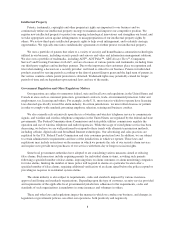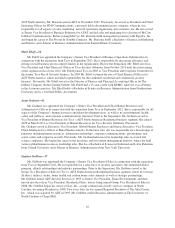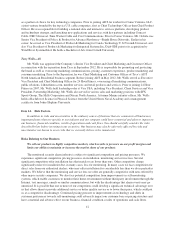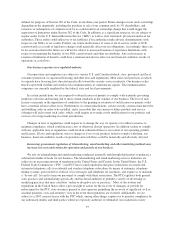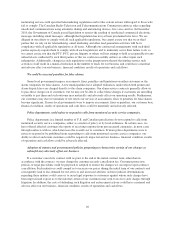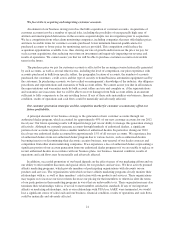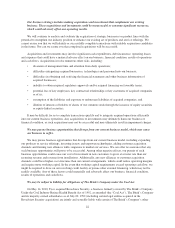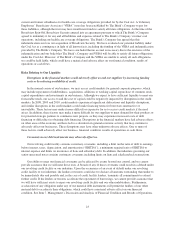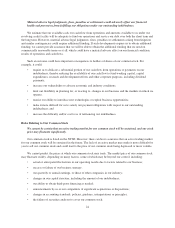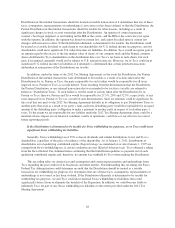ADT 2012 Annual Report Download - page 110
Download and view the complete annual report
Please find page 110 of the 2012 ADT annual report below. You can navigate through the pages in the report by either clicking on the pages listed below, or by using the keyword search tool below to find specific information within the annual report.An event causing a disruption in the ability of our monitoring facilities to operate could adversely affect
our business.
A disruption in our ability to provide alarm monitoring services and serve our customers could have a
material adverse effect on our business. A disruption could occur for many reasons, including fire, natural
disasters, weather, disease, transportation interruption, extended power outages, terrorism or sabotage or as a
result of disruptions to third-party transmission lines. Monitoring could also be disrupted by information systems
and network-related events such as computer hacking, computer viruses, worms or other malicious software,
denial of service attacks, malicious social engineering or other destructive or disruptive activities that could also
cause damage to our properties, equipment and data. While our monitoring systems are fully redundant, a failure
of our back-up procedures or a disruption affecting multiple monitoring facilities could disrupt our ability to
provide monitoring services. In conjunction with the Separation, we entered into a Monitoring Agreement with
Tyco. Pursuant to this agreement, we have entered a transition period, during which our monitoring facilities
include facilities owned and operated by Tyco that provide monitoring services to our customers.
Providers of broadband services may be able to block our services or charge their customers more for
using our services, which could adversely affect our revenue and growth.
Our interactive and home automation services are accessed through the Internet and our security monitoring
services are increasingly delivered using Internet technologies. Some providers of broadband access may take
measures that affect their customers’ ability to use these products and services, such as degrading the quality of
the data packets we transmit over their lines, giving those packets low priority, giving other packets higher
priority than ours, blocking our packets entirely or attempting to charge their customers more for using our
services.
In the United States, there continues to be some uncertainty regarding whether suppliers of broadband
Internet access have a legal obligation to allow their customers to access services such as ours without
interference. In December 2010, the U.S. Federal Communications Commission (the “FCC”) adopted new net
neutrality rules that would protect services like ours from such interference. Several parties have sought judicial
review of the FCC’s net neutrality rules. These appeals are currently pending. Interference with our services or
higher charges to customers by broadband service providers for using our products and services could cause us to
lose existing customers, impair our ability to attract new customers and materially and adversely affect our
business, financial condition, results of operations and cash flows.
We have significant deferred tax assets, and any impairments of or valuation allowances against these
deferred tax assets in the future could adversely affect our results of operations, financial condition and
cash flows.
We are subject to income taxes in the United States and Canada and in various state, territorial, provincial
and local jurisdictions. The amount of income taxes we pay is subject to our interpretation and application of tax
laws in jurisdictions in which we file. Changes in current or future laws or regulations, the imposition of new or
changed tax laws or regulations or new related interpretations by taxing authorities in the jurisdictions in which
we file could materially and adversely affect our financial condition, results of operations and cash flows.
Our consolidated federal and state income tax liability may be significantly reduced by tax credits and tax
net operating loss (“NOL”) carryforwards available to us under the applicable tax codes. Our ability to fully
utilize these deferred tax assets, however, may be limited for various reasons, such as if projected future taxable
income becomes insufficient to recognize the full benefit of our NOL carryforwards prior to their expirations or,
in addition, should income attributable to specific subgroup members relative to total U.S. consolidated income
be sufficient to allow for full NOL utilization. Our ability to fully use these tax assets will also be adversely
affected if we have an “ownership change” within the meaning of Section 382 of the Code. An ownership change
is generally defined as a greater than 50% increase in equity ownership by “5% shareholders,” as the term is
18


